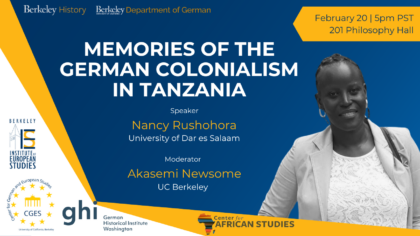News & Events
Events
The Department of German hosts and co-sponsors a range of events throughout the year, including conferences, lecture series, and weekly/biweekly colloquia and social activities.
-
Ugliness as Political Construct
Read moreTime: - 12:30 PMDate: Location: Zoom
Speaker: Moshtari Hilal
Moderator: Lilla Balint, UC Berkeley Moderator: Be Schierenberg, UC Berkeley Moshtari Hilal is a visual artist, writer and curator based in Hamburg and Berlin. Hilal studied Islamic Studies and Political Science with a focus on Gender and Decolonial Theory in Hamburg, Berlin and London. She is co-founder of the collective AVAH (Afghan Visual Arts and History) and the research project CCC (Curating Through Conflict with Care) as part of ngbk in Berlin. Together with political geographer Sinthujan Varatharajah, Hilal published September 2022 at Wirklichkeit Books the conversation book “English in Berlin – Exclusions in a Cosmopolitan Society”. Varatharajah and Hilal were awarded the supporting price for critique by the…
-
Sara Pugach | Marxists and other Migrants: African Intellectual Pathways from the German Democratic Republic
Read moreTime: - 12:00 PMDate: Location: 201 Philosophy Hall
Speaker: Sara Pugach, Professor of History, California State University
Sponsor(s): German Historical Institute Washington | Pacific Office Berkeley, Institute of European Studies, Institute of Slavic, East European and Eurasian Studies This paper will look at the later careers of Africans who studied in the German Democratic Republic. While I intend to write about former educational migrants who took all sorts of routes after their university or vocational training, this particular talk focuses on those students who became professors in the humanities or social sciences. I will explore the impact that their studies in the GDR had – or did not have – on their academic careers. Some of the…
-
Nancy Rushohora | Memories of the German colonialism in Tanzania
Read more
Time: - 6:30 PMDate: Location: 201 Philosophy Hall
Speaker: Nancy Rushohora, Archaeology and Heritage Studies, University of Dar es Salaam
Sponsor(s): Institute of European Studies, Center for German and European Studies, German Historical Institute Washington | Pacific Office Berkeley, Center for African Studies This presentation focuses on recent research on secrets and silences on memories of German colonialism in Tanzania, specifically, the area between Rufiji and the Ruvuma River in southern Tanzania. Dated 1880’s and taking over the long-established trade connection with the Asiatic world, establishing the German colonial rule of the region was not easy. The use of violence to bring the Tanzanians to their knees resulted in more than 50 resistances that the Germans were involved in…
-
Professor and Chair Karen Feldman will be joining Martin Jay for the talk “Immanent CritiquesThe Frankfurt School under Pressure”
Read more
Time: - 1:00 PMDate: Location: 220 Stephens Hall
Speaker: Professor Karen Feldman (German) and Professor Martin Jay (History)
This is part of the Berkeley Book Chat series, organized by the Townsend Center. Please see below for more information and registration: Martin Jay Immanent Critiques The Frankfurt School under Pressure Weds Feb 7 | 12-1 pm 220 Stephens Info & Registration Honoring the Frankfurt School’s practice of immanent critique, Martin Jay (History) puts critical pressure on a number of its own ideas by probing their contradictory impulses. He is joined by Karen Feldman (German).
-
Kaffeeklatsch
Read moreTime: - 4:30 PMDate: Location: German Library (5401 Dwinelle Hall)
Speaker: Kaffeeklatsch Team
We’ll be in the library of the German Department (Dwinelle 5401) with coffee, cookies and casual conversation in German from 2:00-4:30 pm! The event is open to all levels of language proficiency, faculty, current, former, and future students, and anyone interested in German. If you feel like helping us reduce waste, bring your own coffee mug. Please feel free to forward this email to anyone you think might be interested! Wir freuen uns auf euch! As a reminder, Kaffeeklatsch will be a weekly affair! Bis bald, Das Kaffeeklatschteam
-
Workshop: “The Affordance of Form in Narrative Fiction: Towards a Typology”
Read moreTime: - 3:00 PMDate: Location: 282 Dwinelle Hall
Presenter: Professor Frauke Berndt (Zürich)
-
Sexual Violence between Idyll and Legend: Gottfried Keller’s „Meretlein“
Read moreTime: - 7:00 PMDate: Location: 282 Dwinelle Hall
Speaker: Professor Frauke Berndt (Universität Zürich)
-
Minority and Majority as Asymmetrical Concepts: The Perils of Democratic Equality and Fantasies of National Purity
Read more
Time: - 6:30 PMDate: Location: 201 Philosophy Hall
Speaker: Till van Rahden, Professor of German and European Studies, Université de Montréal
Sponsor(s): Institute of European Studies, Center for German and European Studies, UC Berkeley Department of History, German Historical Institute Washington | Pacific Office Berkeley, UC Berkeley Department of German, DAAD, Center for Jewish Studies The conceptual couple of majority/minority is viewed as a harmless way of identifying an arithmetic relationship. The idea of a dichotomy between majority and (Jewish) minority as a short hand to describe relations between ethnic or religious groups, however, is recent. In fact, as it did not exist before 1919 when in the wake of World War I the idea of democracy and the idea of the homogeneous nation-state triumphed simultaneously. Prior to…
-
Mosse Lecture
Read moreTime: - 5:00 PMDate: Location: BAMPFA
Speaker: Werner Herzog
-
Fluid Dreamscapes: Lin Hierse in Conversation with Elizabeth Sun and Deniz Göktürk
Read moreTime: - 1:30 PMDate: Location: ZOOM Meeting: https://berkeley.zoom.us/j/91753283777?pwd=OWowT2k4clNWdEhMYkEvbHBQSHNnUT09
Speaker: Lin Hierse will be in dialogue with Elizabeth Sun and Deniz Göktürk
Lin Hierse holds an M.A. in Asian Studies and Urban Geography from the Humboldt University of Berlin. She currently works as a journalist and author in Germany, and has been an editor at die tageszeitung (taz) since 2019, where she wrote the column poetical correctness from 2020 to 2023. Her first novel, Wovon wir träumen [What we dream about], was published by Piper in 2022. In elegant and moving narration, the auto-fictional novel offers glimpses and sound bites from the protagonist’s life in Shanghai and Berlin, weaving in fragments from her mother and grandmother’s lives during China’s Cultural Revolution in the 1960s. Transitions between places in…



